The document discusses operator overloading in Scala, highlighting its differences from languages like C++ and Java, and how operators function as methods. It provides examples of defining binary and unary operators, operator precedence, and naming conventions, along with practical code examples for creating complex numbers and fragments. The document also touches on implicit conversions and showcases testing strategies using ScalaTest.
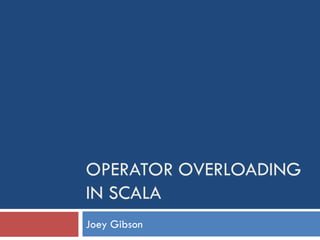


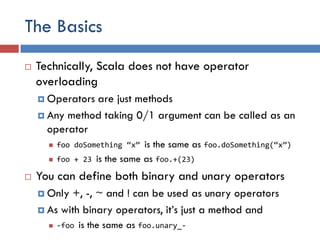
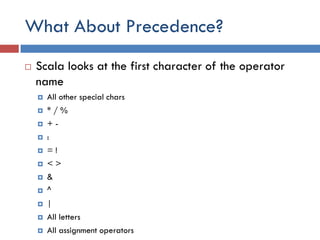
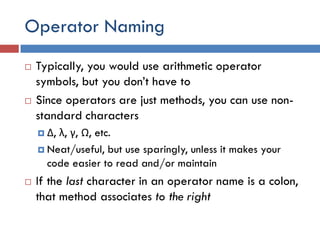

![ComplexTest.scala
package com.joeygibson.oopres
import org.junit.runner.RunWith
import org.scalatest.FlatSpec
import org.scalatest.matchers.ShouldMatchers
import org.scalatest.junit.JUnitRunner
@RunWith(classOf[JUnitRunner])
class ComplexTest extends FlatSpec with ShouldMatchers {
"A Complex" should "sum up to 4-9i" in {
val c1 = new Complex(1, 2)
val c2 = new Complex(2, -3)
val c3 = c1 + c2
val res = c1 + c2 * c3
res.toString should equal ("4-9i")
}
}](https://image.slidesharecdn.com/oopres-100115085700-phpapp01/85/Operator-Overloading-In-Scala-8-320.jpg)
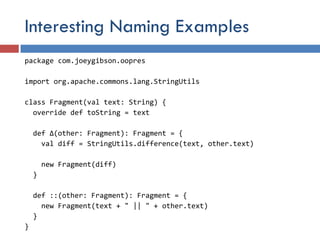
![Testing Interesting Names
package com.joeygibson.oopres
@RunWith(classOf[JUnitRunner])
class FragmentTest extends FlatSpec with ShouldMatchers {
it should "return proper differences" in {
val f0 = new Fragment("Scala is groovy")
val f1 = new Fragment("Scala is cool")
val diff = f0 Δ f1
diff.toString should equal("cool")
}
it should "concatenate properly" in {
val f0 = new Fragment("First Fragment")
val f1 = new Fragment("Second Fragment")
val f2 = f0 :: f1
f2.toString should equal ("Second Fragment || First Fragment")
}
}](https://image.slidesharecdn.com/oopres-100115085700-phpapp01/85/Operator-Overloading-In-Scala-10-320.jpg)
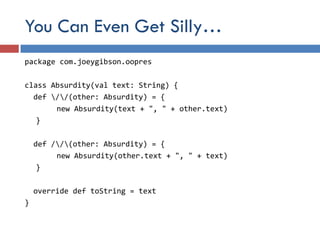
![Testing the Silliness
package com.joeygibson.oopres
@RunWith(classOf[JUnitRunner])
class AbsurdityTest extends FlatSpec with ShouldMatchers {
it should "do something absurd" in {
val a = new Absurdity("foo")
val b = new Absurdity("bar")
val c = a // b
c.toString should equal ("foo, bar")
}
it should "do something equally absurd" in {
val a = new Absurdity("foo")
val b = new Absurdity("bar")
val c = a // b
c.toString should equal ("bar, foo")
}
}](https://image.slidesharecdn.com/oopres-100115085700-phpapp01/85/Operator-Overloading-In-Scala-12-320.jpg)
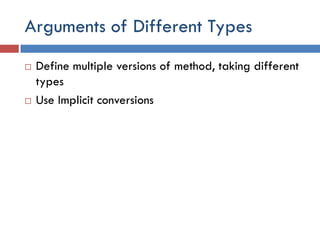
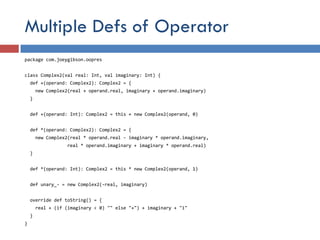
![Testing Multiple Defs
package com.joeygibson.oopres
@RunWith(classOf[JUnitRunner])
class Complex2Test extends FlatSpec with ShouldMatchers {
it should "convert int to Complex2" in {
val c = new Complex2(1, 2)
val d = c + 23
d.toString should equal ("24+2i")
}
// it should "convert int to Complex2, reversed" in {
// val c = new Complex2(1, 2)
// val d: Complex2 = 23 + c
//
// d.toString should equal ("24+2i")
// }
}](https://image.slidesharecdn.com/oopres-100115085700-phpapp01/85/Operator-Overloading-In-Scala-15-320.jpg)
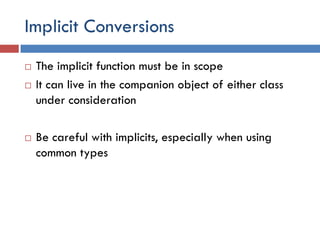
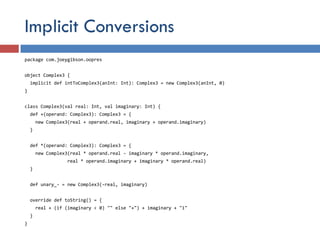
![Testing Implicits
package com.joeygibson.oopres
@RunWith(classOf[JUnitRunner])
class Complex3Test extends FlatSpec with ShouldMatchers {
it should "convert int to Complex3" in {
val c = new Complex3(1, 2)
val d = c + 23
d.toString should equal ("24+2i")
}
it should "convert int to Complex3, reversed" in {
import com.joeygibson.oopres.Complex3.intToComplex3
val c = new Complex3(1, 2)
val d: Complex3 = 23 + c
d.toString should equal ("24+2i")
}
}](https://image.slidesharecdn.com/oopres-100115085700-phpapp01/85/Operator-Overloading-In-Scala-18-320.jpg)

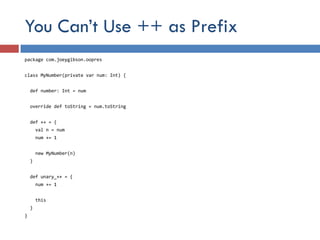
![The First One Works, The Second…
package com.joeygibson.oopres
@RunWith(classOf[JUnitRunner])
class MyNumberTest extends FlatSpec with ShouldMatchers {
it should "post increment" in {
val x = new MyNumber(23)
val z = x++
z.number should equal (23)
x.number should equal (24)
}
// it should "pre increment" in {
// val x = new MyNumber(23)
// val z = ++x
//
// z.number should equal (24)
// x.number should equal (24)
// }
}](https://image.slidesharecdn.com/oopres-100115085700-phpapp01/85/Operator-Overloading-In-Scala-21-320.jpg)
